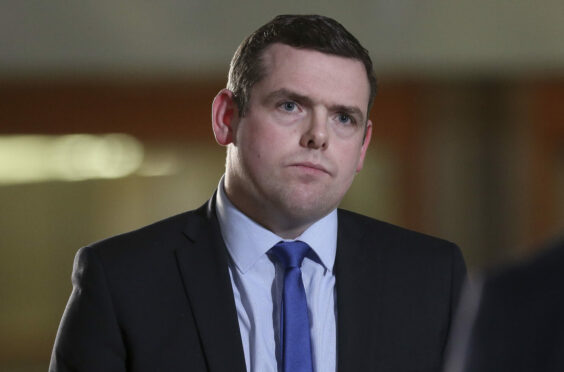
As family feuds go, this was a very public whopper. Tension between Douglas Ross, leader of Scotland’s Tories, and Boris Johnson, Prime Minister and Leader of the UK-wide party under whose umbrella they sit, is not new.
Ross resigned as a minister in Johnson’s government during the early days of the Covid pandemic after Dominic Cummings’ infamous visit to Barnard Castle.
So we could see last week coming. Indeed, Ross telegraphed it weeks ago by making clear that if Johnson didn’t pass the sniff test of truth over the alleged Downing Street parties, he would call for his resignation.
However, that did not reduce the size of the political earthquake when it happened. The act itself was significant, but the chain of events it set off were more so. The response of Jacob Rees-Mogg, in particular, in calling Ross a lightweight figure and tacitly demeaning the value of the Scottish arm, told a story.
The words came out of Rees-Mogg’s mouth, but they were in the heads of Tories all over the southern part of the UK, who have never been able to reconcile themselves to devolution.
So, what is the motivation, and what is the plan? Well, it depends who you speak to. There are some senior figures in the party’s establishment, including former Scottish leaders, who wish Johnson would resign in order to be replaced with someone they consider more palatable – Chancellor Rishi Sunak, for instance.
They think, they pray, that this act alone will fix the problem, unify the party, save the Union of UK nations, and ensure everyone lives happily ever after.
Others see this as something of an ostrich strategy that chooses to ignore what they see as a problem of structure rather than personality.
They believe the Johnson/Ross war is simply an escalation of a tension that has been present throughout the entirety of devolution, from the days of David McLetchie and Iain Duncan Smith, through to Annabel Goldie and David Cameron, to now.
They see two problems ahead; two steamrollers coming towards them while they remain tied to the road. The first is the inability of the centre-right in Scotland to form a government. Scotland is unique in European politics, with a centre-right that is too weak to win on its own, and too toxic to attract a partner to govern.
By remaining part of the Conservative Party, whose permanent unpopularity in Scotland places a ceiling on their support, they are consigning themselves to perpetual loss.
The second steamroller is the end of the Union itself. When Murdo Fraser attempted, a decade ago, to create a separate party, his opponents in the party establishment cited the analogy between a separating party and a separating country.
This argument is now dead. The juxtaposition of a strong, governing Conservative Party in England and its relatively weak, opposition party in Scotland foments the negative sentiment towards the Union.
The unequal electoral fortunes of the parties is a metaphor for the unequal relationship between the nations.
The future is, in the final analysis, in the hands of Ross. He will either be remembered as an establishment figure who put the unity of the Conservative Party first. Or he will be remembered as the trailblazer who created a party that could win in Scotland, and that could save the UK in the process.
It is difficult to imagine a more appropriate time for Ross to make his move.
Andy Maciver is director of Message Matters and former head of communications for the Scottish Conservatives

Enjoy the convenience of having The Sunday Post delivered as a digital ePaper straight to your smartphone, tablet or computer.
Subscribe for only £5.49 a month and enjoy all the benefits of the printed paper as a digital replica.
Subscribe

